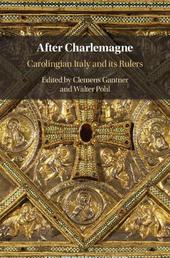
|
After Charlemagne: Carolingian Italy and its Rulers
Hardback
Main Details
| Title |
After Charlemagne: Carolingian Italy and its Rulers
|
| Authors and Contributors |
Edited by Clemens Gantner
|
|
Edited by Walter Pohl
|
| Physical Properties |
| Format:Hardback | | Pages:350 | | Dimensions(mm): Height 235,Width 160 |
|
| ISBN/Barcode |
9781108840774
|
| Classifications | Dewey:945.02 |
|---|
| Audience | | Professional & Vocational | |
|---|
| Illustrations |
Worked examples or Exercises
|
|
Publishing Details |
| Publisher |
Cambridge University Press
|
| Imprint |
Cambridge University Press
|
| Publication Date |
17 December 2020 |
| Publication Country |
United Kingdom
|
Description
After Charlemagne's death in 814, Italy was ruled by a succession of kings and emperors, all of whom could claim some relation to the Carolingians, some via the female line of succession. This study offers new perspectives on the fascinating but neglected period of Italy in the ninth century and the impact of Carolingian culture. Bringing together some of the foremost scholars on early medieval Italy, After Charlemagne offers the first comprehensive overview of the period, and also presents new research on Italian politics, culture, society and economy, from the death of Charlemagne to the assassination of Berengar I in 924. Revealing Italy as a multifaceted peninsula, the authors address the governance and expansion of Carolingian Italy, examining relations with the other Carolingian kingdoms, as well as those with the Italian South, the Papacy and the Byzantine Empire. Exploring topics on a regional and local level as well as presenting a 'big picture' of the Italian or Lombard kingdom, this volume provides new and exciting answers to the central question: How Carolingian was 'Carolingian Italy'?
Author Biography
Clemens Gantner is Researcher at the Department for Historical Identity Research at the Institute for Medieval Research, Austrian Academy of Sciences, where his research is focussed on early medieval Italy and intra- and intercultural communication around the Mediterranean. He is the author of Freunde Roms und Voelker der Finsternis (2014), editor of The Resources of the Past in Early Medieval Europe (2015) and is preparing a monograph on Louis II, great-grandson of Charlemagne and emperor in Italy in the ninth century. Walter Pohl is Professor of History at the Institute for Austrian Historical Research, University of Vienna and Director of the Institute for Medieval Research, Austrian Academy of Sciences. His research addresses many aspects of early medieval history, with a special interest in Italy. His publications include The Avars: A Steppe Empire in Central Europe, 567-822 (2018), Strategies of Identification: Ethnicity and Religion in Early Medieval Europe, ed. Walter Pohl and Gerda Heydemann (2013) and over 200 journal articles. In 2004 he was awarded the Wittgenstein Prize, and he has been a recipient of an ERC Advanced Grant (2010) and a Synergy Grant (2019).
Reviews'This collection of papers by leading international experts gives access to the immense cultural productivity and textual richness of Carolingian Italy, to its manifold regional traditions and to its continuous openness to external influence.' Stefan Esders, Freie Universitat Berlin 'Gantner and Pohl have assembled a star-studded international cast to investigate the distinctiveness of ninth-century Italy. In challenging the very notion of 'Carolingian' Italy', this book offers rigorous and stimulating new interpretations of the narrative, documentary and manuscript sources concerning the politics, society and culture of Italy under Carolingian rule.' Rosamond McKitterick, University of Cambridge 'In the rich historiography on the Carolingians, less attention has in the past been paid to Italy; but now high-quality work is being done. This book brings that work together exceptionally well. It assembles the major experts on Carolingian Italy, and shows an exciting range of new approaches. All early medievalists will need to read it.' Chris Wickham, University of Oxford 'Highly recommended.' G. I. Halfond, Choice
|